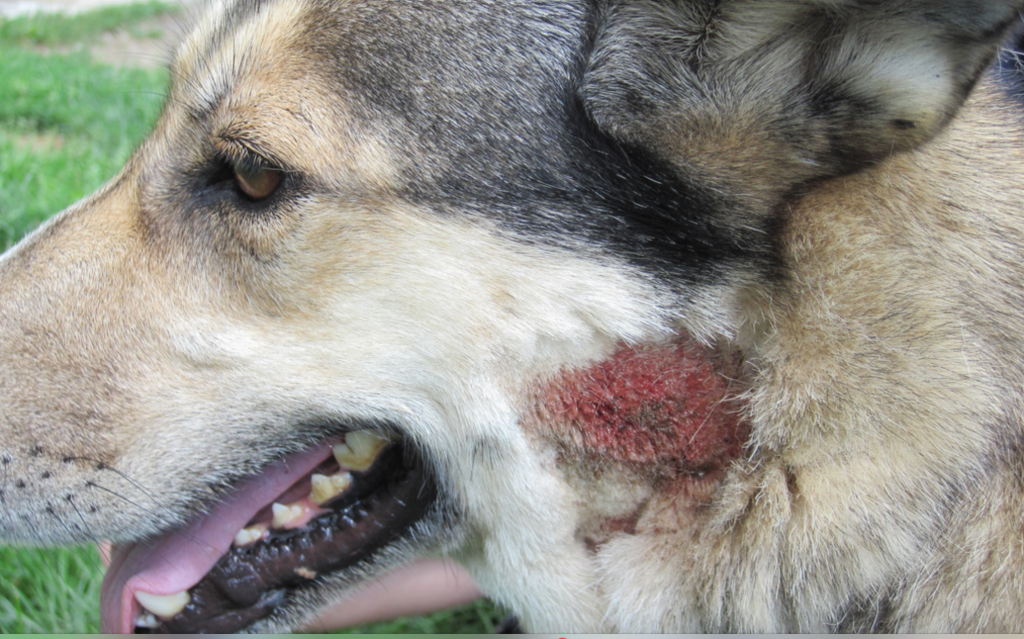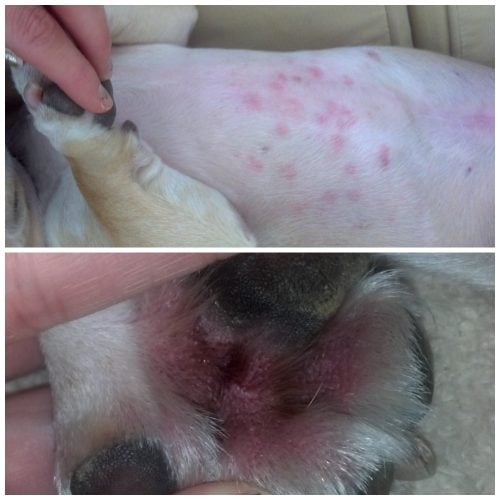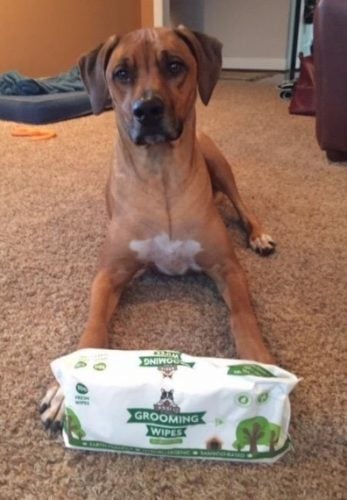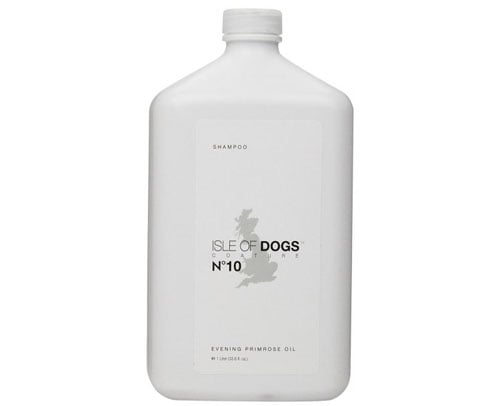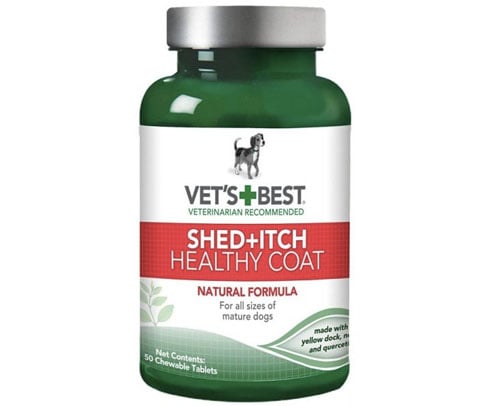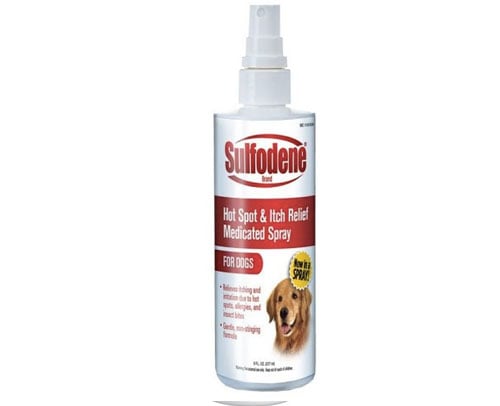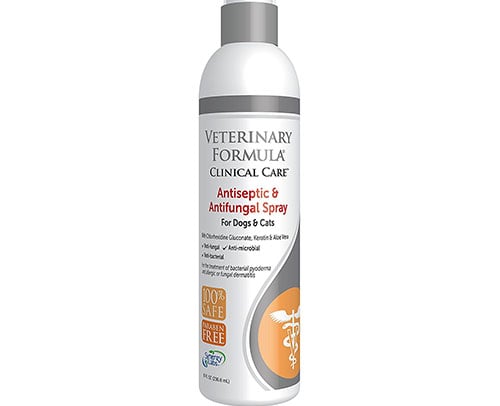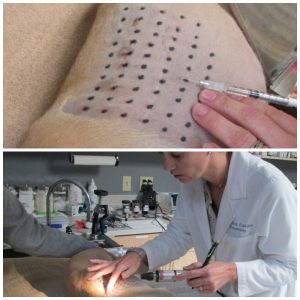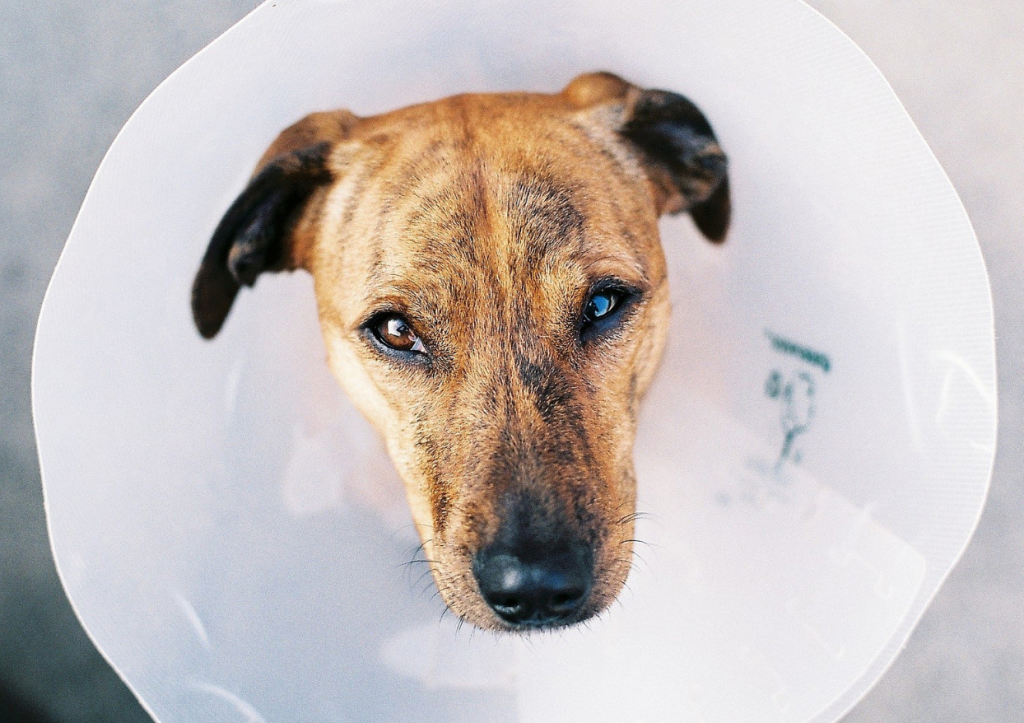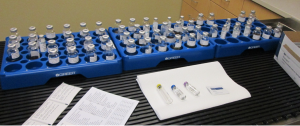
apoquel-for-dogs[/caption]
My clinical experience with Apoquel (oclacitinib), updated 11/1/16
Dr. Melissa Eisenschenk, DVM, DACVD
Apoquel® is the brand name of oclacitinib, an FDA approved immune suppressant drug in the Janus Kinase (JAK) inhibitor class made by Zoetis. This drug inhibits primarily JAK-1 and -3 signaling that would normally occur when a cytokine binds to a receptor on the surface of the cell. This includes blocking the effects of inflammatory cytokines released from activated lymphocytes (IL-2, -4, -6, -13) as well as IL-31, a cytokine directly involved in the sensation of itch. JAK signaling is important to the function of the bone marrow as well. Apoquel works differently than steroids, antihistamines, or cyclosporine.
Apoquel works rapidly, usually within 24 hours, to diminish itching. It is very rare to have GI upsets with Apoquel like we can see with cyclosporine. The antipruritic effects of the Apoquel wear off quickly, within 12-24 hours, so the medication needs to be given daily in most cases.
Dosing/Administration:
The dose of Apoquel is 0.4-0.6 mg/kg every 12 hours for up to 14 days, then 0.4-0.6 mg/kg once daily thereafter. Apoquel is not FDA approved to use twice daily longer than 14 days. The dose range is very strict, I do not recommend going above the recommended dose due to immune suppression, below the range and it doesn’t seem to work in most cases. I have seen 2 cases, both collies, where they were able to have half or less their regular dose and do ok.
Apoquel works rapidly, most pets see complete relief within 2 days. We typically give it twice daily for 7 days if the pet is very uncomfortable, then go to once daily. If it has not worked after a week, it is very unlikely to work better with continued use in my opinion. Zoetis reports that 60% of moderate to severe atopic dermatitis cases are controlled long term, likely because severe cases would do better on twice daily dosing. It is rare that Apoquel controls pruritus in dogs whose allergies were so severe that they require daily steroids.
In humans, it is not recommended to give some of these JAK inhibitor drugs with CYP3A4 inhibitors like ketoconazole. I have not seen bad side effects giving almost any drug with Apoquel, including ketoconazole. The only possible interaction I have seen so far is with pets getting more sleepy than normal when Apoquel was given with Benadryl, possibly Temaril P, and these were individual cases.
Long term studies of giving Apoquel along with other immunosuppressants like steroids and cyclosporine have not been done. My clinical experience would suggest that steroids at anti-inflammatory doses of 0.5mg/kg twice daily and taper is seems to be safe for the short term. If steroids are needed with Apoquel, evaluate how well the Apoquel is actually working for the patient. Apoquel is effective very quickly, so there is no need to transition slowly from steroids to Apoquel. Obviously a short transition may be needed to prevent an Addisonian crisis in a pet who has been on high doses or daily steroids for more than a month.
Apoquel is only FDA approved for dogs who are greater than 12 months of age. The reason for this is that below 1 year of age, demodicosis and pneumonia were seen at an unacceptable level when Apoquel was given at 3 x and 5 x the regular dose.
Side Effects:
Other drugs in the same drug class as Apoquel include drugs for humans for rheumatoid arthritis, psoriasis, and cancer. In humans, the side effects of drugs in the JAK inhibitor class of drugs include: neutropenia, anemia, thrombocytopenia, increased liver values, increased cholesterol, UTI, weight gain, herpes zoster.
Apoquel side effects listed for dogs in the product insert include: vomiting, diarrhea, lethargy, anorexia, SQ or dermal masses (unspecified), decreased leukocytes, decreased globulins, and increased cholesterol and lipase. Low numbers of dogs in the studies developed demodicosis, neoplasia, pneumonia, bloody diarrhea, skin and ear infections, UTIs, and histiocytomas. Interestingly, a few dogs developed polydipsia, increased appetite, and aggression, similar to what may be seen with steroids.
My Experiences:
I have started over 1000 dogs on Apoquel. It is fairly rare to see side effects while a pet is on Apoquel. Bone marrow suppression is the most concerning side effect, but we have only seen this in about 1% of pets on Apoquel. No outward signs were seen in these cases who had bone marrow suppression (other than zero allergy symptoms), only changes on bloodwork were discovered. This is why we recommend bloodwork at the 2-3 month point after starting Apoquel. In the rare cases I have seen, the bone marrow recovered after a few weeks of stopping Apoquel. Even in cases where the CBC values do not go below normal, it is common for the values to sink towards the low end, the clinical significance of this is not known. Steroids and cyclosporine do not cause bone marrow suppression even at extreme doses, so this is one downside to Apoquel.
Ear infections seem at an unusually high rate in my opinion, at least compared to what I have seen with steroids or cyclosporine- drugs which tend to prevent ear infections. Sometimes we also see urinary tract infections while pets are on Apoquel, however, I am suspicious this type of infection is more common in patients who have allergies anyway.
Similarly to the side effect of weight gain seen in humans on JAK inhibitors, I have seen weight gain in dogs on Apoquel, not to the degree seen with prednisone. Perhaps they are getting less exercise from not scratching as much. It would be nice to perform a study with normal dogs, who (like humans) may tend to gain weight over time no matter what drugs they are on.
Some dermatologists have used Apoquel in cats (desperate cases) with some success, however this use is not FDA approved, high doses are needed, and more than once daily dosing is needed. I have not had luck with this drug in the handful of cats I have tried it on.
So far, I have not had Apoquel help with conditions other than allergic dermatitis in dogs.
We don’t know long term side effects of Apoquel in dogs, time will tell. The product insert warns that Apoquel may exacerbate neoplastic conditions. There is no good evidence of this as of yet, we will keep monitoring. I would recommend Apoquel over cyclosporine in a dog with previous cancer. Comfort and quality of life are absolute considerations when deciding which medications to use.
Monitoring:
Our protocol for Apoquel is to check a CBC/Chem6 prior to starting Apoquel, then at 3 months, then once yearly. The CBC is the most important piece of information for monitoring. It is important to make sure the dog does not have liver disease prior to starting the Apoquel. The only exception to this would be liver elevations caused by steroids. Time will tell if urine monitoring is important. Since we have not been monitoring urinalyses routinely, it is possible there are silent UTIs.
Summary:
I like Apoquel. The benefits of Apoquel include: rapid onset of action, low likelihood of GI side effects, rare side effects with long term use, no withdrawal needed for skin testing, and decent price. The downsides include: increased infections, monitoring needed for bone marrow suppression, does not work for many pets, and we do not have long term data. It is a wonderful option for those dogs who do not tolerate steroids or cyclosporine. Allergy testing and shots remains the only effective management of allergies that does not involve immune suppression.
Monitor blood work prior to administering this medication (especially in older animals), at 3 months, and then annually thereafter until we have more information about long term use in dogs. I do not recommend using this medication against the recommendations on the drug insert.
Does your dog have allergies? If so, your conventional veterinarian may offer you a new allergy drug called Apoquel
®.
It’s being touted as “a fast-acting and safe treatment for the control of acute and chronic canine pruritus.”
Pruritus means itching … and if you’ve got an itchy dog you’re probably desperate to make your dog more comfortable and stop his constant scratching. Apoquel is said to ease your dog’s itching in as little as 4 to 24 hours. And dog owners report that it does relieve their dogs’ itching.
Sounds like something you might want to try, right?
Well, not so fast …
Before you expose your dog to the risks associated with this new drug, read on. And if your dog is already on Apoquel you’ll probably want to stop the drug as soon as you can, once you find out how it demolishes essential parts of your dog’s internal disease fighting systems.
Allergies And The Immune System
An allergy is an exaggerated and inappropriate response of the immune system. Conventional medicine loves to suppress symptoms.
Suppressing can be defined as getting rid of the symptoms without helping the body to rid itself of the illness or disease. So if allergies are an improper response of the immune system, what are the kinds of drugs that have typically been used to suppress and destroy that same immune system?
The History Of Dog Allergy Drugs
First came prednisolone, prednisone and other steroids, which work by suppressing the functioning of the immune system.
Then, when allergic dogs stopped responding to steroids, veterinarians started using Atopica (cyclosporine). Cyclosporine was initially developed to prevent organ transplant rejections in humans. It works by suppressing the immune system so that the patient doesn’t reject the transplanted organ.
And then they started using it for dogs with allergies. Atopica has a devastating and destructive effect on the immune system. Read what I wrote about Atopica back in 2012.
Atopica is still harming dogs today. The Food and Drug Administration (FDA) has 17 pages of adverse events (starting on page 452) that have been reported for oral use of Atopica (cyclosporine) in dogs!
Here are just the top 12 from the first page!

Those are some pretty alarming numbers … and it’s ironic that the fifth side effect on the list is pruritus, which means itching – the very thing the drug is designed to stop! And now, there’s another scary allergy drug called Apoquel
® (oclacitinib maleate) that suppresses your dog’s immune system in a different way.
Read on to learn what it does.
What is Apoquel For Your Dog And How Does It Work?
Apoquel
affects kinases. Kinases are important signaling compounds that the body’s cells use to communicate with each other.
In the 1980s, an Australian chemist discovered some new ones, known as JAK1, JAK2, JAK3 and TKY2.
JAK initially stood for Just Another Kinase but was later renamed Janus Kinase.
JAKs are key elements in controlling both growth and development. These particular JAKs do the work of:
- Policing the body against tumor formation
- Controlling body growth and development
- Forming white and red blood cells
- Providing immunity with proper functioning of your dog’s antibody-producing cells (B cells) and the “policing” cells (T-cells)
- Regulating inflammatory response
Recognizing the epidemic of dogs with allergies, pharmaceutical companies saw the opportunity to create a drug would stop these JAKs in their tracks.
They sure succeeded.
Oclacitinib maleate, under the brand name Apoquel
®, is a Janus kinase inhibitor. That means it stops JAKs from doing their job.
Apoquel Stops Life-Sustaining JAKs
Apoquel’s
mechanism is to interrupt JAKs and prevent them from working.
Without JAKs your dog’s immune system, along with other systems, cannot function correctly.
JAK1 is vital for the constant surveillance within your dog’s body to find and destroy abnormal cells that have become cancerous before they form tumors.
JAK1 also is an imperative messenger necessary for destroying invading parasites, fungi, bacteria and viruses.
JAK2 is central to the production of bone marrow stem cells that then become red and white blood cells and platelets.
Your dog’s antibody system (B cells) and its killer-cell system (T cells) need JAK3 in order to work well.
These JAKs all talk to each other and share information to keep your dog’s body healthy. So you can see that by preventing JAKs from working, Apoquel seriously undermines your dog’s immune system.
What The Research Says About Apoquel
A study conducted by the manufacturer to test Apoquel’s safety and efficacy stated:
“There were no fatalities and no abnormal health events that necessitated hospitalization in either the study phase [day 0–7 (+3 days)] or the continuation phase [day 8–28 (±20 days)] of the study. Given that the majority of dogs in the placebo group withdrew after the completion of the study phase, the incidence of abnormal clinical signs was similar in both groups (Table 3).”

So, it seems from these comments and Table 3 showing adverse effects that the drug is fairly safe …
… but did you notice the duration of the study? That’s right – only 7 days!
There was a “continuation phase” after the 7 day study period, from 8 to 30 days. The researchers report:
“Six dogs (four oclacitinib and two placebo group) were withdrawn from the study during the continuation phase for abnormal health events. Abnormal health events were reported in 11 of 179 oclacitinib-treated dogs post-study. These were as follows: diarrhoea (four dogs; severe enough to warrant cessation of treatment in one dog); vomiting (four dogs); fever, lethargy and cystitis (one dog); an inflamed footpad and vomiting (one dog); and diarrhoea, vomiting and lethargy (one dog).”
So about 6% of dogs tested had abnormal health events. That doesn’t seem very high.
But that was only for 30 days!
Nobody has tested the safety of Apoquel for more than 30 days … and yet, if your dog takes this drug, he could be on it for years!
Years when his immune system will be compromised by the drug – because that’s how it works! The manufacturer has limited Apoquel for use only in dogs over 12 months old.
That’s because, when they conducted “margin of safety” studies on 6 and 12 month old dogs, they had to discontinue the study for 6-month old dogs when the dogs developed bacterial pneumonia and demodectic mange infections!
Here’s the warning on the company’s website:

In the margin of safety study on 12-month old dogs, some of the symptoms that were considered likely to be related to Apoquel included:
- papillomas (warts)
- interdigital furunculosis (cysts) with related dermatitis symptoms (local alopecia, erythema, abrasions, scabbing/crusts
- edema of feet
- lymphadenopathy (abnormal or swollen lymph nodes) in peripheral nodes
Yes, you read right … the side effects include various types of skin disease in dogs who are being treated for allergies!
The drug was also found to lower white and red blood cell count and affect certain types of lymphatic tissue and lymph nodes as well as bone marrow.
Detailed information about the studies is provided under the Prescribing Information tab on the company’s website … and if you’re considering giving your dog Apoquel, you (and your vet) should read it before you make a decision.
Sometimes I feel that the world of modern medicine has gone mad. One in two dogs is getting cancer.
(Read our article on the Natural Treatment of Cancer, Click Here.)
And yet here is a new anti-itch drug that not only opens up the door to cancer – but hangs up a welcome sign as well.
There Are Alternatives To Apoquel For Your Dog
There are better and safer alternatives to these dangerous allergy drugs.
As just one example, when I see dogs with allergies in my own practice, I create a tailored Allergy Elimination Program – based on the original work in NAET (Nambudripad’s Allergy Elimination Technique) – and it works incredibly well for over 90% of the patients I treat.
It’s non-toxic and has the effect of creating a stronger immune system that will fight off cancer and disease.
Meanwhile, this new drug that stops that worrisome and at times intolerable itching, causes low white cell count, low red cell count, stunted growth – and can increase your dog’s risk of cancer.
When I became a veterinarian I vowed to protect the health of our pets. I wanted to make them healthier and help them live longer and happier lives.
Sometimes, with all these new and confusing drugs that pet owners rush to without understanding, I feel like I’m swimming upstream.



